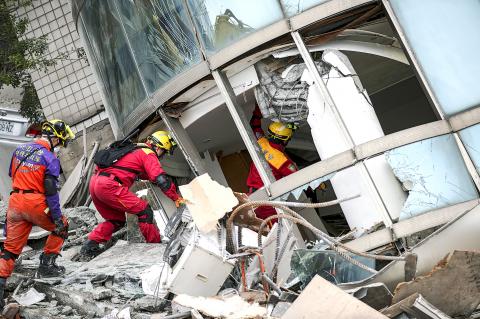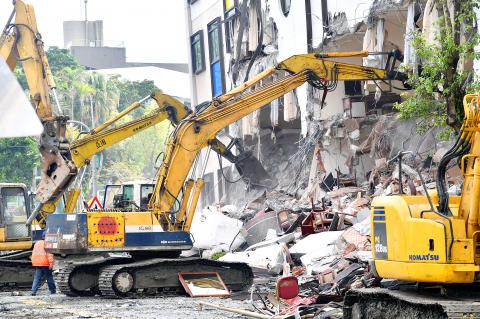The Yun Men Tsui Ti (雲門翠堤) commercial and residential complex, the building most seriously damaged in Tuesday’s magnitude 6.0 Hualien earthquake, is now the focus of an investigation to determine if human error was behind the partial collapse of four structures in downtown Hualien.
Hualien District Prosecutors’ Office head prosecutor Wang Yi-jen (王怡仁) said his office has retrieved the building construction licenses, building use permits and applications for alterations for all four of the buildings that suffered serious damage in the earthquake.
The buildings are the Yun Men Tsui Ti building, the Marshal Hotel (統帥飯店) and two apartment buildings.

Photo: EPA-EFE
The Yun Men Tsui Ti building is the focus of the investigation, because of the number of deaths — nine out of the 12 confirmed — attributed to its partial collapse, Wang said.
Civil engineers have said that the method used to connect the building’s steel bars likely contributed to the serious casualties reported at the site.
Architecture experts have also raised questions over the building’s receding facade and the ground-floor arcade, which was taller than it should have been, as it was used for stores.

Photo: CNA
According to construction regulations, the steel bars used in constructing the building should have been 1.3 times their actual lengths so they could be layered upon one another to enhance the building’s structural integrity, but they were not assembled in this manner, Tainan Structural Engineer Association director-general Huang Chia-jui (黃嘉瑞) and association member Wang Wu-lung (王武龍) said.
“As a result, the columns snapped like ropes,” Huang said, while Wang added that the way the steel bars snapped appeared “suspicious.”
By itself, each connection point between steel bars is weak, so the legal construction method is to make several connections converge, thereby enhancing the sturdiness of beams and columns, and Yun Men Tsui Ti had “clearly fallen short” in this regard, Huang said.
Based on a preliminary review of the building, the steel bars were not layered, which highlights problems in its safety, Executive Yuan Public Construction Commission Chairman Wu Tze-cheng (吳澤成) said.
However, the disproportionately heavy upper levels of the building likely caused the columns to give out, he said.
Yun Men Tsui Ti, like all other residential buildings in its proximity, sits on the Milun fault, but was the only one that collapsed during the earthquake, which raised questions over its construction quality, National Taiwan University geology professor Chen Wen-shan (陳文山) said.
The building collapsed in a roughly north-to-south direction, but it was the steel bars facing the north that were broken and exposed, indicating that that the building’s construction was likely flawed, New Taipei City Professional Civil Engineers Association chairman James Yu (余烈) said.
Additional reporting by CNA

The US government has signed defense cooperation agreements with Japan and the Philippines to boost the deterrence capabilities of countries in the first island chain, a report by the National Security Bureau (NSB) showed. The main countries on the first island chain include the two nations and Taiwan. The bureau is to present the report at a meeting of the legislature’s Foreign Affairs and National Defense Committee tomorrow. The US military has deployed Typhon missile systems to Japan’s Yamaguchi Prefecture and Zambales province in the Philippines during their joint military exercises. It has also installed NMESIS anti-ship systems in Japan’s Okinawa

‘WIN-WIN’: The Philippines, and central and eastern European countries are important potential drone cooperation partners, Minister of Foreign Affairs Lin Chia-lung said Minister of Foreign Affairs Lin Chia-lung (林佳龍) in an interview published yesterday confirmed that there are joint ventures between Taiwan and Poland in the drone industry. Lin made the remark in an exclusive interview with the Chinese-language Liberty Times (the Taipei Times’ sister paper). The government-backed Taiwan Excellence Drone International Business Opportunities Alliance and the Polish Chamber of Unmanned Systems on Wednesday last week signed a memorandum of understanding in Poland to develop a “non-China” supply chain for drones and work together on key technologies. Asked if Taiwan prioritized Poland among central and eastern European countries in drone collaboration, Lin

BACK TO WORK? Prosecutors said they are considering filing an appeal, while the Hsinchu City Government said it has applied for Ann Kao’s reinstatement as mayor The High Court yesterday found suspended Hsinchu mayor Ann Kao (高虹安) not guilty of embezzling assistant fees, reducing her sentence to six months in prison commutable to a fine from seven years and four months. The verdict acquitted Kao of the corruption charge, but found her guilty of causing a public official to commit document forgery. The High Prosecutors’ Office said it is reviewing the ruling and considering whether to file an appeal. The Taipei District Court in July last year sentenced Kao to seven years and four months in prison, along with a four-year deprivation of civil rights, for contravening the Anti-Corruption

NO CONFIDENCE MOTION? The premier said that being toppled by the legislature for defending the Constitution would be a democratic badge of honor for him Premier Cho Jung-tai (卓榮泰) yesterday announced that the Cabinet would not countersign the amendments to the local revenue-sharing law passed by the Legislative Yuan last month. Cho said the decision not to countersign the amendments to the Act Governing the Allocation of Government Revenues and Expenditures (財政收支劃分法) was made in accordance with the Constitution. “The decision aims to safeguard our Constitution,” he said. The Constitution stipulates the president shall, in accordance with law, promulgate laws and issue mandates with the countersignature of the head of the Executive Yuan, or with the countersignatures of both the head of the Executive Yuan and ministers or